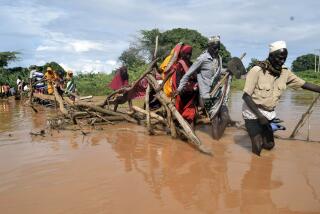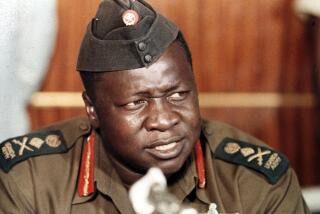Kenyans flock to the polls, hoping to avoid tribal clashes
Nairobi, KENYA -- Kenyans lined up before dawn Monday to vote in a tight presidential election, with tribal tensions simmering beneath the surface despite vows by politicians and activists to prevent the bloody clashes that marred a disputed 2007 presidential vote.
The two front-runners in a field of eight presidential candidates, Raila Odinga and Uhuru Kenyatta, lead political coalitions based around rival tribal groupings, but have vowed to abide by the outcome of the voting. President Mwai Kibaki is stepping down after serving two five-year terms, the constitutional limit.
More than 14 million Kenyans are registered to vote for parliamentarians, senators, governors and local officials, with 12,000 candidates for various positions in an election that is costing the country more than $284 million, according to local media.
Tensions have been exacerbated by the fact that Kenyatta and his running mate, William Ruto, have been charged with crimes against humanity by the International Criminal Court, accused of inciting killings and violence in the 2007 vote. They deny the charges but face trial in coming months.
Election day was relatively peaceful Monday, but in 2007 the trouble started only after the announcement of results triggered a bitter dispute and tribal clashes across the country.
Estimates of the number killed in 2007 vary from 1,000 to 1,500. Thousands more were beaten, raped or forcibly circumcised, while villages were burned to the ground.
In one particularly gruesome incident, women and children were locked in a church in Kiambaa village outside the town of Eldoret and the building was then set on fire, killing about 30 people. Attackers threw one baby into the flames, witnesses said afterward.
There was violence Monday, when attackers near the coastal town of Mombasa ambushed police. Suggesting the attack had no tribal element, authorities blamed a local separatist group and reported that 15 died in the incident -- nine police and six attackers.
The main complaint Monday concerned organizational chaos and long delays in voting caused partly by malfunctions in fingerprint identification technology.
In a sign of how desperate Kenyans are to shake off the violence of 2007, four major newspapers ran identical front-page editorials urging peace.
“The elections are the last opportunity for us as a country to get our politics right. If we bungle today’s election or go back to killing each other, not only will the world give up on us as a civilized nation, but Kenyans too could lost faith in their own country.
“Any calls for street protests that could led to violence must be completely rejected. The Kenyan people must not allow themselves to be define by one bungled election,” the editorials read.
But in the slum area of Mathare, some people packed up and fled their homes or closed their shops before the vote, fearing a repeat of the violence that tore through the area in 2007, according to local residents.
“Some are running away. Some are fearful because of what happened in the last election, said Dorcas Wanjiku, 32, a shoe seller, who lined up at 2 a.m. and waited five hours to vote. “Business is down, everyone is reserving their money. There’s fear around.”
She said renewed tribal violence after the election would be “a disaster” for the country. But she was angry about the ICC charges against Kenyatta, who is from her Kikuyu tribal group, and media reports that key witnesses against him had been killed.
“Nowadays the case [against him] has become weaker and weaker,” said Wanjiku, who lives in a Kikuyu-dominated neighborhood.
A friend, Phyllis Wanjiku, (no relation) said Kenyatta’s supporters would be furious if he was voted in but still had to face ICC charges.
“We would have bloodshed,” she said. “This is what we are fearing.”
In another area of Mathare, dominated by the rival Luo tribe, George Ouma Oduor, 23, a tailor, said gangs of Luo youths had been threatening residents for the past week.
He said he feared rioting and violence if Odinga, a Luo, didn’t win.
“These gangs say, ‘If you know your neighbor is a Kikuyu, tell him to leave and if you don’t, you will be in trouble.’ I was afraid because I can’t leave and go to another place.
“Me as a Kenyan, I don’t want to see violence, because violence makes us refugees.”
ALSO:
China college admissions bias is testing girls’ patience
45 arrested in Hong Kong for smuggling baby milk formula
Cuba and other Venezuela beneficiaries worry about life after Chavez
More to Read
Start your day right
Sign up for Essential California for news, features and recommendations from the L.A. Times and beyond in your inbox six days a week.
You may occasionally receive promotional content from the Los Angeles Times.






